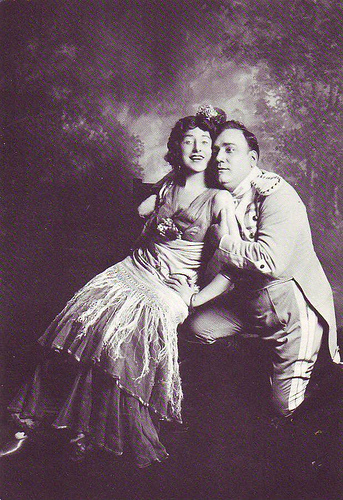Dialogues or recitatives?
This is the first question to ask when you are planning a performance of
Carmen in 2023.
As written by Bizet, Carmen was an 'opéra comique'. By the times of Bizet this meant basically that it contained spoken dialogues and would be performed at the Opéra Comique theatre, even if the subject was a tragedy.
With the death of Bizet, just three months after the premiere of
Carmen, the owners of the score, the publisher firm Choudens, asked Ernest Guiraud to introduce recitatives based on Ludovic Halévy poetry. Guiraud also reorchestrated music from Bizet's
L'Arlésienne suite to provide a ballet for Carmen's second act. In this format, the opera was to be performed in Vienna and Brussels. In each city, some but not all recitatives were used, and even some dialogues were kept, but
Carmen was very successful.
Choudens then decided to publish the score with the recitatives of Guiraud, and other changes. The rationale, apart from the success, was that Bizet himself was ready before his death to work on those recitatives, at the request of Choudens.
Fast forward to the 1960s. The original dialogues were still there, and they were used to perform
Carmen at the Opéra Comique, and also for the odd performance here and there, but the musicologist Fritz Oeser using several sources such as:
1.- The autographed manuscript bequeathed to Paris Conservatory by Bizet's widow.
2.- The piano-vocal score prepared by Bizet
3.- Performing documents of the premiere, found by Oeser himself.
4.- Staging indications
prepared a critical edition for Carmen, using the dialogues, and trying to be as close as possible to the original Bizet's version. Even going as far as to include music that Bizet himself has finally decided not to include for the premiere, or for the piano-vocal score, on the premise that is was due 'to the influence of others'.
Guiraud's recitatives were very competent, and helped the opera to reach its iconic status. The dialogues are not easy to handle anyway for non-French singers, and require a superior acting ability.
Personally I loved both dialogues and recitatives, but given the choice of a version to perform, and providing I could count with the right singers for it, I would choose the premiere version, with spoken dialogues.
Caruso and Farrar as
Don José and
Carmen
These are the numbers of the opera, based on the Choudens publication of Guiraud schema, back in 1875:
Act 1
1. Prelude
2. Sur la place chacun passe
3. Avec la garde montante
4. La cloche a sonné
5. (Habanera): L'amour est un oiseau rebelle
6. Carmen! Sur tes pas nous pressons!
7. Parle-moi de ma mère
8. Que se passe-t-il là-bas? Au secours! Au secours!
9.Tra-la-la...Coupe-moi, brûle-moi
10. (Seguidilla): Près des ramparts de Séville
11. (Finale): Voici l'ordre; partez
Entr'acte
Act 2
12. Les tringles des sistres tintaient
13. Vivat! Vivat le torero!
14. Votre toast, je peux vous le rendre ... Chanson du toreador
15. (Quintette): Nous avons en tête une affaire!
16. Halte-là! Qui vu là?
17. Je vais danser en votre honneur...La fleur que tu m'avais jetée...Non! Tu ne m'aimes pas!
18: (Finale): Holà! Carmen! Holà!
Entr'acte
Act 3
19. Écoute, compagnon, écoute
20. Mêlons! – Coupons!
21. Quant au douanier, c'est notre affaire
22. C'est les contrabandiers le refuge ordinaire... Je dis que rien ne m'épouvante
23. Je suis Escamillo, torero de Grenade!
24. (Finale): Holà holà José!
Entr'acte
Act 4
25. A deux cuartos!
26. Les voici, voici la quadrille ... Si tu m'aimes, Carmen
27. (Finale): C'est toi! – C'est moi!
Of course,
Carmen is the main role, and one of the more important for a female voice in all the standard repertoire. It can be sung by a mezzo or by a soprano. Her main numbers are:
Habanera - Tra La La La - Les Tringles (solo numbers)
Ramparts de Séville - Je vais danser - C'est toi (duets with Don José)
Don José, a soldier and a man in love, a French lyrical tenor. His numbers:
La fleur que tu m'avais jetée - Halte-là! (solo numbers)
Parle-moi de ma mère (duet with Micaela)
Je suis Escamillo (duet with Escamillo)
The young and naive
Micaela, the girl from Navarra must be sung by a light-lyrical soprano, and sound pure and angelic, as far from Carmen as possible.
Je dis que rien ne m'épouvante (solo)
Escamillo, the bullfighter. Convinced of his own worth, but also in love with Carmen. A short but significant role for a baritone.
Chanson du toreador (solo)
I'm quite serious about Opera, and I love "Carmen", one of my favorites.






